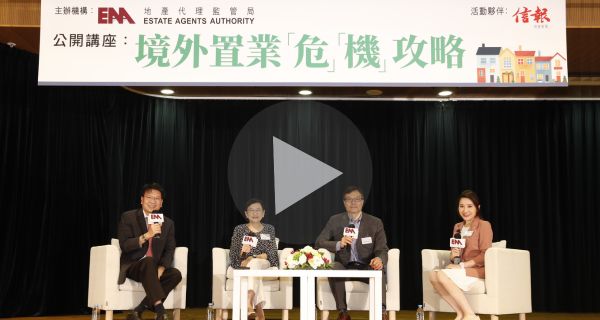
Important details to note before entering into a residential tenancy agreement
Important details to note before entering into a residential tenancy agreement
2020-09-21When selecting a flat to rent, many people may only focus on the amount of rent, location and size of the flat, overlooking some other important details. In order for the public to understand these important details relating to renting of residential properties, the Estate Agents Authority (“EAA”) has organised a Facebook live seminar (in Cantonese) on the dos and don’ts regarding renting of residential properties to be held at 3pm on 26 September 2020. All are welcome to watch the live seminar through visiting www.facebook.com/MetroFinance at the abovementioned time.
No matter if you are letting out or planning to rent a residential property, it would be best to appoint a licensed estate agent to handle the transaction for better protection. Licensed estate agents are regulated by the EAA, they possess professional knowledge in property transactions and can provide professional services to their clients. If you wish to find out whether an agent is holding a valid licence or not, you may visit the EAA’s webpage at: www.eaa.org.hk/en-us/Licence-list
Whether you are a landlord or a tenant, when appointing an estate agent to handle the leasing of a residential property, you should enter into an estate agency agreement prescribed by the law which sets out the important details of an agent’s services and clarify the rights and duties of both parties.
The appointed estate agent has the responsibility to explain the contents of a tenancy agreement to the prospective tenant and provide him/her with a written inventory that lists out all the items which would be leased with the flat. At the time of signing the tenancy agreement, the tenant should pay attention to the details of its terms, such as the rental period, amount of rent and option to renew, etc.
In addition, immediately before a tenancy agreement is entered into, an estate agent appointed by the landlord has to carry out a land search of the property and provide a copy of it to the prospective tenant. He should also explain to the prospective tenant the information on the land search, such as details of current ownership and subsisting mortgage as well as any registered demolition or alteration order, etc.
After the property is successfully leased out, other subsequent services relating to leasing management matters, such as collection of rent for the landlord or maintenance of fixtures inside the flat, are not within the scope of “estate agency work”. If the clients would like their estate agents to provide such services, they should negotiate with the estate agents and enter into an agreement with them separately.
Apart from watching the abovementioned online seminar on 26 September 2020, for those who would like to understand more about the things to note when leasing residential properties may also refer to the EAA’s publication titled “A Guide to Tenancy” or watch the video highlights of the EAA’s previous related seminar held in 2016 (in Cantonese), both of which are available on the EAA’s website.
Ruby Hon
Chief Executive Officer
Estate Agents Authority


